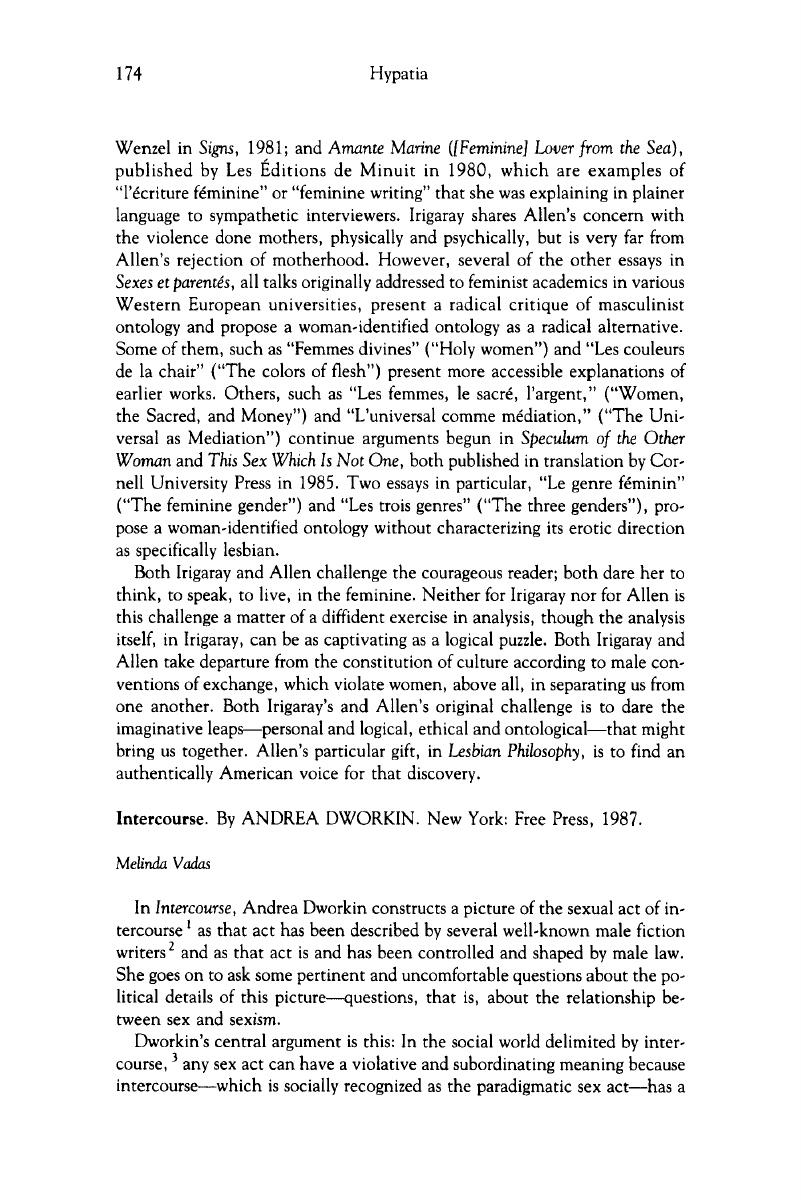No CrossRef data available.
Article contents
Andrea Dworkin. Intercourse. New York, Free Press, 1987.
Published online by Cambridge University Press: 25 March 2020
Abstract

- Type
- Book Reviews
- Information
- Copyright
- Copyright © 1988 by Hypatia, Inc.
References
1 I believe that, for Dworkin, the defining instance or paradigm case of intercourse is the standard one: penetration of the erect penis into the vagina, followed by thrusting to male ejaculation. However, she extends the concept of intercourse to cover any penetration of a woman's (or man's) body, the definitional emphasis being on the penetration of that body: “Having a line at the point of entry into your body that cannot be crossed is different from not having any such line; and being occupied in your body is different from not being occupied in your body” (133).
2 Included among these writers are James Baldwin, Tennessee Williams, Kobo Abe, Isaac Singer, and Leo Tolstoy. Dworkin also devotes a chapter to examining the meaning—and subsequent misinterpretation—of Joan of Arc's actual (i.e., not fictive) resistance to intercourse.
3 In the chapter, “Occupation/Collaboration,” Dworkin notes that, in the social world delimited by intercourse, the problematic meaning of intercourse can and does extend to other sex acts that can be “any violation of a woman's body.” Whether or not there is a social world outside that delimited by intercourse is an open question which, as far as I can see, Dworkin does not seek to close.
4 Necessary, that is, to intercourse as we know it. When Dworkin asks, “Can intercourse exist without objectification? Would intercourse be a different phenomenon if it could, if it did?” (140), I believe that she is suggesting that intercourse without objectification would literally not be the same act. (In which case, calling the act by the same name would seem to me to be problematic.)
5 Dworkin's use of the term “metaphysical” to describe women's inferiority is perhaps not one analytic philosophers would regard as standard. As she uses the term, it clearly does not entail that such inferiority is unalterable. I believe that, for Dworkin, the term “metaphysical” properly refers to or modifies whatever social constructions we tag and perceive as non-social non-constructions—and which constructions are therefore not amenable to conceptual change by way of individual fiat. I think Dworkin's application of this term is illuminating, corresponding, as it does to the social perception of the sort of inferiority (our ‘natural’ fuckability) said to afflict women.
6 Dworkin's analysis of intercourse has been called crazy by those who have the political power to make that label stick. See the New York Times Book Review, May 3, 1987.


